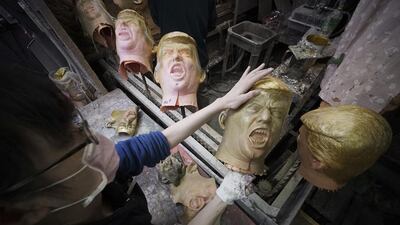There are some scary predictions going around at the moment.
In European defence circles, there is talk of a continent no longer in a “post-war” military climate but “pre-war” instead. A leading British thinker on defence issues, Keir Giles, has published a stark new book suggesting that if Europe does not prepare for a new war, then it needs to prepare to lose it.
On trade, Donald Trump’s return to the US presidency in January comes with the promise of tariffs. That leads to rumblings that globalisation is coming to an end, with uncertainties about world trade, economies and international relations. Meanwhile France, Germany and Spain all have, for different reasons, shaky national governments. And there is the endless humanitarian suffering of the conflicts in the Middle East, Sudan and elsewhere.
November here in the northern hemisphere is a gloomy month, too. Shorter daylight hours and grey skies are not a recipe for optimism.
Nevertheless, there are some reasons to be modestly cheerful. Human problems have human solutions, and there’s nothing new about realistic fears for the future even if they may (thankfully) not come to pass.
I grew up in the Cold War era and remember scary documentaries and fictional TV programmes about northern Europe suffering a “nuclear winter”. The threat was that a nuclear exchange would cause immediate devastation, long-term pollution, crop failures and other catastrophes. Fortunately, common sense and peace prevailed.
And so, rather than fall prey to the European November gloom, Europeans – and indeed the rest of the world – should maybe consider some positive lessons from the past.
In the 1970s, Cold War pessimism was partly addressed by what Germans called, in a rhyming phrase, “Wandel durch Handel”, meaning “change through trade”. West Germans thought trading with East Germany would reduce the chance of conflict and promote stability by changing their communist neighbours economically and therefore create a better world.
On trade, Mr Trump seems to take a different view.
It’s difficult to pin down specific policies, but the future president speaks of tariffs of up to 60 per cent on Chinese imports. That could affect $500 billion of trade. It comes when the Asian giant has its own economic problems. Nevertheless, Chinese President Xi Jinping congratulated Mr Trump on his election victory and said that “a stable, healthy and sustainable China-US relationship is in the common interest of both countries and is in line with the expectations of the international community”.
Well, we can hope. But the US tariff question goes further than China.
It’s being discussed in European capitals and, while Mr Trump’s unpredictability may be a political asset for him, some assume that trading partners will be favoured according to how far Mr Trump divides the world into those who like him and those who do not.
The old German “change through trade” policy could nowadays be shorthand for optimistic globalisation. Poorer producing nations and richer consuming nations become economically intertwined. But for Germany, there are lasting problems in having become dependent on Russian energy, especially since the full-scale invasion of Ukraine in 2022.

In business circles, there is talk of “deglobalising”, “onshoring” and “friendshoring” – that is cutting business links with countries with which there may be serious disagreements. I attended a private meeting recently of senior businesspeople at an international bank. One speaker – an international trade consultant – asked the experts in the room how far they felt “deglobalisation” was real. Most suggested it was a threat rather than a reality, although Mr Trump’s victory and the tariff question may dampen that optimism next year.
The international trade consultant suggested that globalisation is – yes – under pressure, but world trade is so interconnected that it would be very difficult, except in the case of war, to disrupt all those connections. He also pointed out that Chinese companies have set up subsidiaries in third countries less likely to be subject to any Trump trade tariffs.
Besides, onshoring – replacing Chinese workers with higher-paid American workers – might appear to be good patriotic US politics, but it could increase the price of consumer goods. In the 2024 election, President Joe Biden’s record with inflation since 2020 was said by some American commentators to be a vote winner for Mr Trump. You might wonder if “Making America Great Again” through tariffs might raise prices and that – as this month’s election suggests – be politically dangerous.
Sadly, no crystal ball is available to predict what Mr Trump will do with his mandate to make America great again. A four-word slogan is not a policy. But it is easy to see why some commentators remain gloomy about conflict, deglobalisation and the world economy.
The good news – even if you do not like the result – is that the American people have spoken and it seems that the House of Representatives, Senate and presidency are all in Republican hands. No one seriously queries this year’s election results.
Economic protectionism, tariffs and onshoring will become part of our political vocabulary in 2025. But if the idea of “change through trade” sounds old-fashioned, “change through making trade costly” has some very obvious political drawbacks, too. What will Mr Trump do? I don’t know. Does he?










